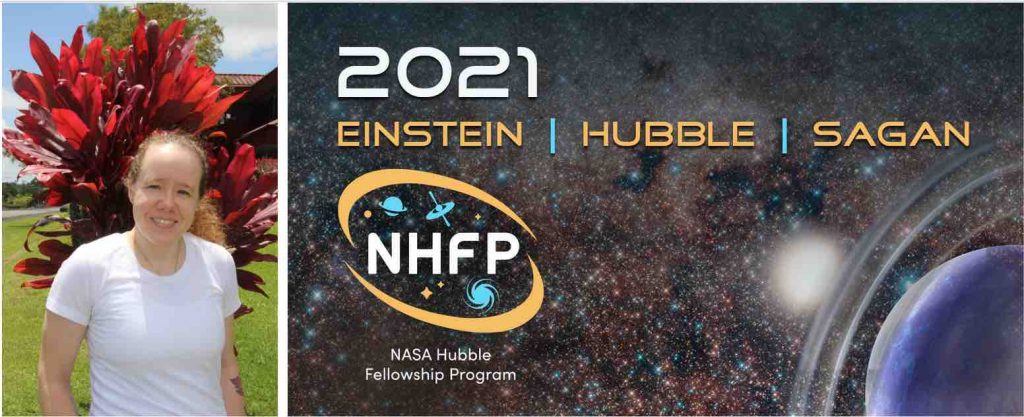
Dr. Alex Tetarenko wins prestigious NASA Fellowship
Dr. Alex Tetarenko, a Hilo-based astronomer who works at the James Clerk Maxwell Telescope (JCMT), has been selected as a new Fellow by NASA for its prestigious NASA Hubble Fellowship Program (NHFP). Dr. Tetarenko was one of 24 NHFP Fellows to be selected out of more than 400 applicants. The program enables outstanding postdoctoral scientists to pursue independent research in any area of NASA Astrophysics, using theory, observation, experimentation, or instrument development.
With the proposed research topic “Unraveling the Complex Nature of Black Holes and How They Power Explosive Outflows with Time-Domain Observations”, Tetarenko will help provide answers on how the universe works.
Alex Tetarenko was born and raised in Calgary, Alberta, Canada. She received her BSc in Astrophysics from the University of Calgary, and she pursued graduate school at the University of Alberta, obtaining her MSc in 2014 and her PhD in 2018. Alex’s PhD thesis was awarded the J.S. Plaskett Medal from the Canadian Astronomical Society for the most outstanding doctoral thesis in Canada. Following her PhD studies, Alex took up an independent fellowship at the Maunakea Observatories in Hawaiʻi, working at the East Asian Observatory’s James Clerk Maxwell Telescope, where she currently resides.
“I am super excited for this amazing opportunity, and while I will be sad to leave the island, I am incredibly grateful for my time here and for all the support I have received over the past several years, which most certainly played a big part in being able to win this Fellowship,” said Tetarenko.
Alex’s research focuses on studying relativistic jets launched from stellar-mass black hole systems in our galaxy, to understand the complex relationship between the mass plunging into a black hole and the material that is jettisoned away. The main goals of her research are to develop new ways to study jets launched from black holes, both in terms of designing observing techniques to gather new types of data, as well as building new computational and statistical tools to analyze this data.
As an Einstein fellow, Alex’s pioneering research program will implement a novel time-domain technique to observe galactic black hole systems at radio wavelengths. This innovative technique, adapting algorithms used in X-ray astronomy, allows her to directly measure the physical properties of black hole jets and how they evolve through measuring how the intensity of the light we receive from these jets varies over different time-scales. With this research, she will place constraints on jet speeds, energetics, and size-scales, in turn allowing her to begin to address key open questions in jet research, such as understanding the energy source of these jets and the impact they have on their environment. This work will also provide benefits to the broader scientific community, through developing statistical techniques that can be applied to big data problems, and building new observing methods applicable for the operations and data analysis at next-generation telescopes.
For more information: https://hubblesite.org/contents/news-releases/2021/news-2021-16
Contact: Dr. Alex Tetarenko a.tetarenko@eaobservatory.org
See this announcement in the West Hawaii Today.



